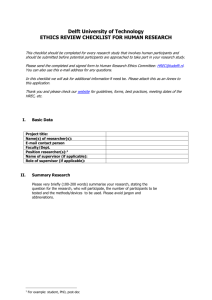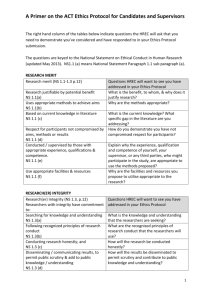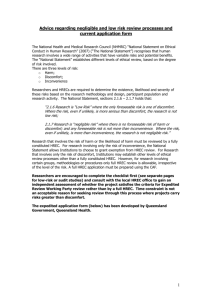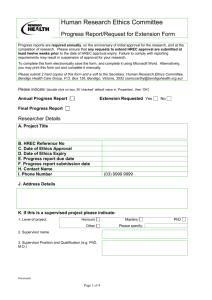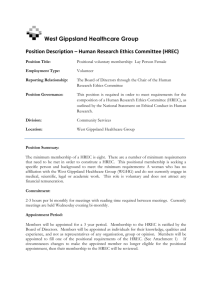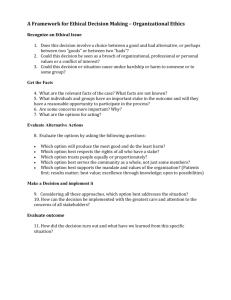Ethical Issues Checklist for Human Research
advertisement
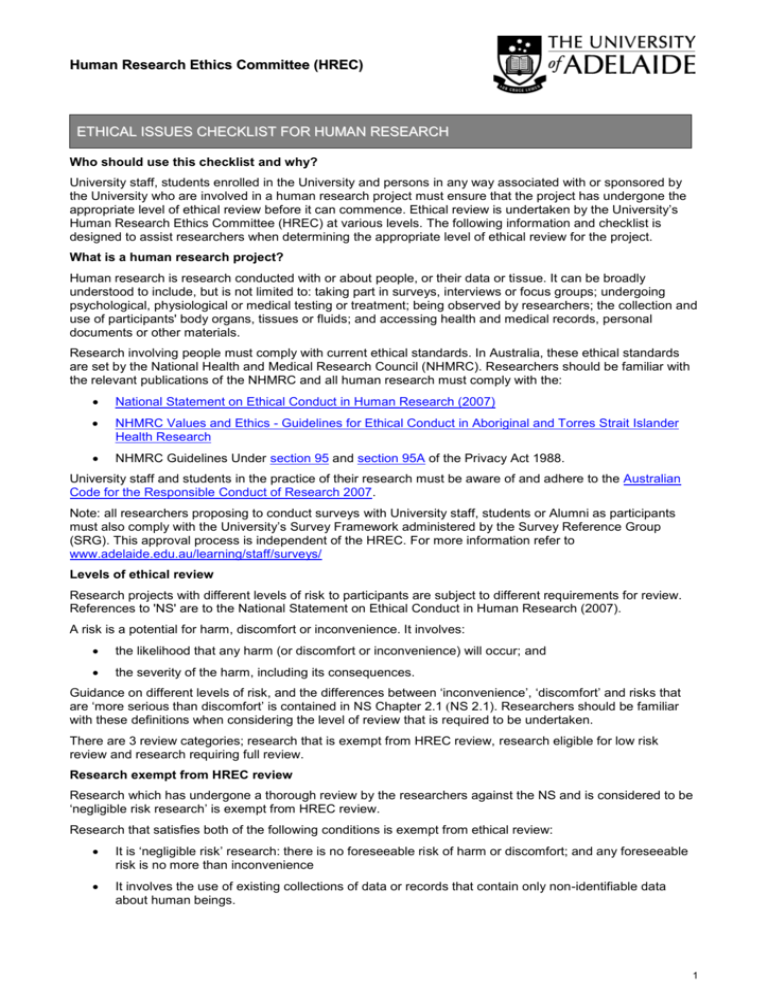
Human Research Ethics Committee (HREC) ETHICAL ISSUES CHECKLIST FOR HUMAN RESEARCH Who should use this checklist and why? University staff, students enrolled in the University and persons in any way associated with or sponsored by the University who are involved in a human research project must ensure that the project has undergone the appropriate level of ethical review before it can commence. Ethical review is undertaken by the University’s Human Research Ethics Committee (HREC) at various levels. The following information and checklist is designed to assist researchers when determining the appropriate level of ethical review for the project. What is a human research project? Human research is research conducted with or about people, or their data or tissue. It can be broadly understood to include, but is not limited to: taking part in surveys, interviews or focus groups; undergoing psychological, physiological or medical testing or treatment; being observed by researchers; the collection and use of participants' body organs, tissues or fluids; and accessing health and medical records, personal documents or other materials. Research involving people must comply with current ethical standards. In Australia, these ethical standards are set by the National Health and Medical Research Council (NHMRC). Researchers should be familiar with the relevant publications of the NHMRC and all human research must comply with the: National Statement on Ethical Conduct in Human Research (2007) NHMRC Values and Ethics - Guidelines for Ethical Conduct in Aboriginal and Torres Strait Islander Health Research NHMRC Guidelines Under section 95 and section 95A of the Privacy Act 1988. University staff and students in the practice of their research must be aware of and adhere to the Australian Code for the Responsible Conduct of Research 2007. Note: all researchers proposing to conduct surveys with University staff, students or Alumni as participants must also comply with the University’s Survey Framework administered by the Survey Reference Group (SRG). This approval process is independent of the HREC. For more information refer to www.adelaide.edu.au/learning/staff/surveys/ Levels of ethical review Research projects with different levels of risk to participants are subject to different requirements for review. References to 'NS' are to the National Statement on Ethical Conduct in Human Research (2007). A risk is a potential for harm, discomfort or inconvenience. It involves: the likelihood that any harm (or discomfort or inconvenience) will occur; and the severity of the harm, including its consequences. Guidance on different levels of risk, and the differences between ‘inconvenience’, ‘discomfort’ and risks that are ‘more serious than discomfort’ is contained in NS Chapter 2.1 (NS 2.1). Researchers should be familiar with these definitions when considering the level of review that is required to be undertaken. There are 3 review categories; research that is exempt from HREC review, research eligible for low risk review and research requiring full review. Research exempt from HREC review Research which has undergone a thorough review by the researchers against the NS and is considered to be ‘negligible risk research’ is exempt from HREC review. Research that satisfies both of the following conditions is exempt from ethical review: It is ‘negligible risk’ research: there is no foreseeable risk of harm or discomfort; and any foreseeable risk is no more than inconvenience It involves the use of existing collections of data or records that contain only non-identifiable data about human beings. 1 Research that uses qualitative methods e.g. face-to-face interactions between participant and researcher; personal interviews; focus groups; oral histories; observation; and on-line research that identifies participants, carries more than negligible risk and therefore requires HREC review (NS 3.1). Researchers are to keep an auditable record of any research that has been exempted from review (NS 5.2.9). Research eligible for low risk review ‘Low risk research’ describes research which satisfies both of the following conditions: There is no foreseeable risk of any harm to participants and others; and any foreseeable risk is no more than discomfort. Discomfort can include minor side-effects of medication, discomfort when taking blood pressure, and anxiety induced by an interview (NS 2.1). It is not included in the following categories: the use without consent of personal information in medical research, or personal health information (NS 2.3.5). interventions and therapies: including clinical and non-clinical trials, and innovations (NS 3.3) human genetics (NS 3.5) human stem cells (NS 3.6) women who are pregnant and the human fetus (NS 4.1) people highly dependent on medical care who may be unable to give consent (NS 4.4) people with a cognitive impairment, an intellectual disability, or a mental illness (NS 4.5) children and young people (with some exceptions) (NS 4.2) people who may be involved in illegal activities (NS 4.6) Aboriginal and Torres Strait Islander peoples (NS 4.7) people in other countries (with some exceptions) (NS 4.8). Low risk research may be reviewed either through a subcommittee of the HREC or executively approved by the HREC Convener. Where the risk, even if unlikely, is more serious than discomfort, the project will require full review. Research timetables should allow for the possibility that a project submitted as a low risk application may be deemed to involve more than low risk, or to raise other issues, therefore requiring full review. Researchers may also be required to provide additional information. Research requiring full review Research that is included in the NS categories listed above, or where the level of risk is more serious than discomfort i.e. harm, or includes concealment or deception, must be submitted for full review. Harm includes physical, psychological, devaluation of personal worth, social, economic and legal harm (NS 2.1). Research where the true purpose, or the collection of data itself, is concealed from participants or where participants are deceived is not considered ethical unless compelling reasons are given for its use. The use without consent of personal information in medical research, or personal health information requires full review, whether the research is low risk or not (NS 2.3.5). Using the Ethical Issues Checklist In the next section you are given a checklist and asked to answer some questions about your research project. This list contains areas and methods of research that have previously raised ethical or other issues by the HREC. Where applicable these are cross referenced to the corresponding chapter of the NS for you to read. Important: this checklist is a general guide only and does not replace the need for researchers to do their own thorough review against the NS. If you require additional information or advice as to the appropriate level of ethical review for your research after completing the checklist, reading the NS or discussing your project with colleagues or supervisors you should contact the HREC Secretariat. Note, all researchers proposing to conduct surveys with University staff, students or Alumni as participants must also comply with the University’s Survey Framework administered by the Survey Reference Group (SRG). Please refer to www.adelaide.edu.au/learning/staff/surveys/ 2 Human Research Ethics Committee (HREC) ETHICAL ISSUES CHECKLIST FOR HUMAN RESEARCH Project Title: (insert) To activate a tick box, double click left mouse button and a ‘check box form fields’ box appears. Select ‘checked’ and OK. To untick do the same again and select ‘unchecked’ and OK. Does your research involve? Research Areas and Methods The use without consent of personal information in medical research, or personal health information? Interventions and therapies: including clinical and non-clinical trials, and innovations? (NS 3.3) Human genetics? (NS 3.5) Yes Possibly No Human stem cells? (NS 3.6)? Assisted reproduction technology? Ionizing radiation (x-rays, fluoroscopy or radioisotopes)? (NS 3) Controversial topics in the community (e.g. AIDS, IVF)? Women who are pregnant and the human fetus? (NS 4.1) Children or young people under the age of 18? (NS 4.2) Persons in dependent or unequal relationships e.g. between participants (line manager-staff, employer-employee) or between participants and researchers (teacher-student)? NS 4.3) People with a cognitive impairment, an intellectual disability, or a mental illness? (NS 4.4, 4.5) People who may be involved in illegal activities? (NS 4.6) Separate identification of, or focus on, Aboriginal and Torres Strait Islander peoples? (NS 4.7) Separate identification of, or focus on, other minority or culturally sensitive groups of people or their communities? Research on people living overseas (NS 4.8)? Research methods that identify participants, e.g. questionnaires, surveys, personal interviews (group or individual), focus groups, oral histories, observation and on-line research? Involves collection of data or interviews not in a public place i.e. in people’s homes? Research where the true purpose, or the collection of data itself, is concealed from participants or that participants are in any way deceived? Any situation where the informed consent of participants cannot be given or assured e.g. observation of participants without their knowledge? Payments or inducements other than reasonable reimbursement for travel, time spent participating in the research? Any perceived, possible or actual conflicts of interest e.g. where a researcher or organisation is in a commercial relationship? Go to next page… 1 Is HREC review required? If you answered Yes or Possibly to any of these questions the research will require HREC review and you will need to submit an application for low risk or full review. If you answered No to every question this is a good indicator that your research is ‘negligible risk research’ and is exempted from HREC review remembering that this checklist is a general guide only and does not replace the need for researchers to do their own thorough review against the National Statement. Researchers satisfied that the research is negligible risk research should sign the declaration below and retain this checklist and declaration. This document can be used in the auditable record of any research undertaken that has been exempted from HREC review (NS 5.2.9). Researcher’s Declaration: I/we have read the National Statement on Ethical Conduct in Human Research (2007). I/we, the researcher(s) agree: That the research to be undertaken in the above named project is ‘negligible risk research’ and is exempted from review by the Human Research Ethics Committee (HREC); To only carry out this research project where adequate funding and personnel is available to enable the project to be carried out according to good research practice and in an ethical manner; To maintain the confidentiality of all data from or about project participants and to store the data according to the Australian Code for the Responsible Conduct of Research 2007 and other legislative requirements; To notify the HREC in writing immediately if any change to the project is proposed that might require review by the HREC and await approval before proceeding with the proposed change. Principal researcher’s signature: Name: Date: Researcher signature: Name: Date: Researcher signature: Name: Date: Researcher signature: Name: Date: Note: add additional signature lines as required. 2
